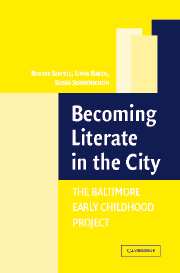Book contents
- Frontmatter
- Contents
- Preface
- 1 Early Appropriation of Literacy in Sociocultural Context
- 2 Growing Up in Baltimore : The Early Childhood Project
- 3 The Intimate Culture of Children's Homes
- 4 Processes of Literacy Enculturation in the Home
- 5 The Development of Literacy Competencies and Orientations
- 6 The Agenda and Practices of Schooling
- 7 Relations Between Homes and Schools
- 8 Conclusions and Implications for Policy and Practice
- References
- Name Index
- Subject Index
6 - The Agenda and Practices of Schooling
Published online by Cambridge University Press: 17 December 2010
- Frontmatter
- Contents
- Preface
- 1 Early Appropriation of Literacy in Sociocultural Context
- 2 Growing Up in Baltimore : The Early Childhood Project
- 3 The Intimate Culture of Children's Homes
- 4 Processes of Literacy Enculturation in the Home
- 5 The Development of Literacy Competencies and Orientations
- 6 The Agenda and Practices of Schooling
- 7 Relations Between Homes and Schools
- 8 Conclusions and Implications for Policy and Practice
- References
- Name Index
- Subject Index
Summary
The children we have described in earlier chapters were engaged in the process of becoming literate through interactions with their parents, siblings, and peers in their homes and communities. Why then is it seen as a matter of such importance for their literacy development that they be enrolled in school? School in contemporary Baltimore society, as elsewhere in America and in many other societies, is understood to be a place where children receive advance preparation for many of the challenges of adult life, and becoming literate is seen as an essential part of that preparation (Serpell & Hatano, 1997).
In this chapter, we explain how this responsibility for preparing children for the challenges of adulthood was interpreted by the public schools of Baltimore in the 1990s. We begin by discussing how the construct of public schooling has come to be interpreted in the United States. We next review the politicization of educational opportunity for children of African heritage. The first two sections provide a foundation for understanding the Baltimore City Public Schools System, the topic of the third section in this chapter. In the remainder of the chapter, we focus on the specific schools attended by the children in the Early Childhood Project and the teachers who taught these children. We describe the practices of the teachers, their account of the meaning and purposes informing those practices, and their impressions of the cohort of children in their classrooms.
- Type
- Chapter
- Information
- Becoming Literate in the CityThe Baltimore Early Childhood Project, pp. 182 - 217Publisher: Cambridge University PressPrint publication year: 1958



